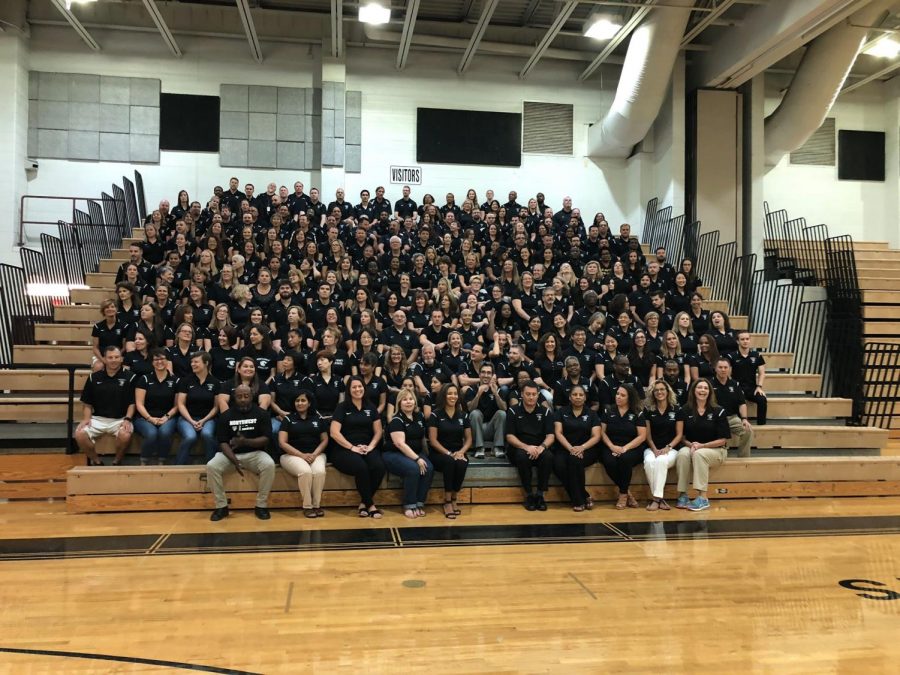Students aren’t alone with the struggles of online learning
As we juggle the uncertainty and the challenges of staying at home and quarantining because of COVID-19, we are forced to learn how to keep our lives going without putting ourselves in danger. For teachers and students, this means a transition from in-person schooling to online learning.
While students are struggling to stay motivated and productive during this strange time, teachers at Northwest are experiencing unprecedented circumstances with their own struggles as well.
Without face-to-face interaction with their students, teachers are finding it difficult to maintain the same expectations and standards as in the classroom. Teachers can’t have everyday conversations with their students or help them with concepts and activities as effectively. Social studies teacher, Steven Krempasky says, “Not only do I enjoy talking and interacting with my students every day but it’s also easier to answer questions and explain things in person.” Brooks Randolph, a math teacher, even adds, “I miss the chatter in the classroom.” (Personally, I think that all teachers lowkey miss it as well.)
Because of the difficulty in communication with students, teachers are having to alter their normal teaching styles. Music director Emily Carpenter is “trying to be very flexible and give [her] students meaningful activities …while trying to respect their time.” Casey Leach, an art teacher, is not as focused on the outcome of her students’ work as she is on their skill implementation. She says that while their work may not be the strongest, “as long as they continue their creative goals while still using their learned skills, [she sees] that as a success.” English teacher, Maggie Ledrick, is working on reducing her assignments and making them more clear. “I’ve been trying to provide assistance from every angle of learning style I can.”
Staying focused and motivated at home is just as difficult for teachers as it is for students. Since teachers already have many responsibilities and interests outside of the classroom, it is even harder to avoid them while doing online schooling. Mrs. Carpenter is home with another teacher who is doing online learning, “having to watch [their] 14 month old.” English teacher Kevin Rigsby says, “I have a grill, a dog, and an Xbox that I’d rather play with.” (Completely understandable.)
As students and teachers transition to online schooling, it is important to notice how our school’s administration and the county have implemented it. Our school administration has been consistently staying in touch with students and staff through emails, social media, and even a staff parade. Mr. Rigsby explained that “Our administration has been excellent…attentive, flexible, and supportive.” Several teachers agree that the Northwest administration is doing the best that they can during these uncertain times.
Many teachers are more disappointed with the county’s actions. Mrs. Carpenter claims that they are “more frustrating than anything.” Whenever the county made decisions about online learning, they notified everyone at the same time, including the teachers. Mr. Rigsby says, “Teachers have been learning about the changes at the same time as the general public, leaving us unable to answer questions and concerns.” Similarly, several teachers said that the timing of the county made it very difficult for teachers to plan and prepare for their classes. While this transition to online learning was unexpected and unprecedented, the county’s actions seem to have only further complicated the process for teachers.
While this school year has come to an end, it is still uncertain whether we will return to schools this coming fall. For struggling teachers and students, here is a compilation of advice about online schooling from the teachers that were interviewed:
- “Getting a calendar or to-do list and laying out what is happening in all of your classes makes it feel less daunting.” – Ms. Ledrick
- “While the end may not be in sight right now, there is an end to this.” – Mr. Rigsby
- “Those that will be most successful will be those that persevere and continue looking ahead.” – Mr. Randolph
- “Your health takes precedence over your work!” – Mx. Leach
- “Part of this whole experience means that we have to learn new ways of coping on our own, to become our own leaders at times.” – Mrs. Daniels-Peroutseas
- “You are resilient!” – Mr. Krempasky
Last but not least, the simplest yet somehow most motivating piece of advice: “DO SOMETHING” – Mrs. Carpenter

